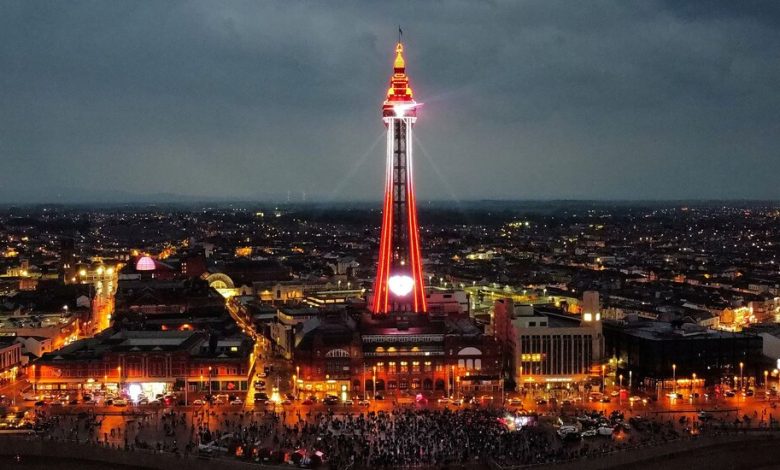Struggling Seaside Town Shows Challenges for New U.K. Leader

BLACKPOOL, England — The famed annual light show still illuminates the sky each night in the seaside town of Blackpool in England’s northwest, having survived the nationwide effort to conserve energy. But beneath the glitter, the evidence of decades of decline are everywhere.
The signs on the small hotels that line long stretches of the coastline have faded, and “vacancy” notices flash in their front windows. Shuttered storefronts dot the roads in the center of town. The doorways of defunct nightclubs are crowded with those sleeping rough.
Liz Truss, who took over as Britain’s prime minister on Tuesday, will have no shortage of issues to address in a country facing grave economic crises. On Thursday, Ms. Truss is set to announce a plan to limit the sharp rise in energy costs.
But the most daunting challenges will come in towns like Blackpool, already one of the most deprived in England, according to government statistics.
Blackpool South, where the popular Pleasure Beach amusement park stands, long supported the Labour Party but switched to backing the Conservative Party in the 2019 election that brought Boris Johnson to power. It was one of the poorest areas of England to switch parties.
But with costs for nearly everything rising, and worries that energy bills could skyrocket to thousands of pounds a year for the average household, there are already indications of cracks in the Conservative coalition.
“I do not think that having Liz Truss or Rishi Sunak would have made any difference to the economy of Blackpool,” said Ava Makepeace, a resident, referring to Ms. Truss’s opponent in the leadership race that ended this week in her victory,
Ms. Makepeace, 51, was critical of Conservative policies, and said that Brexit, which Blackpool overwhelmingly favored in a 2016 referendum, had also had a negative effect on the town.
“No one can get decent staff anymore,” she said of the restaurants and hotels that had relied on overseas workers. “And poverty in certain areas of central Blackpool are the worst they have ever been.”
The Fall of Boris Johnson, Explained
The Fall of Boris Johnson, Explained
Turmoil at Downing Street. Boris Johnson stepped down less than three years after a landslide election victory, following a series of scandals that have ensnared his government. Here’s the backstory:
The Fall of Boris Johnson, Explained
The Pincher case. Mr. Johnson’s downfall was linked to the resignation of Chris Pincher, a Conservative deputy chief whip, after he admitted to having groped two men. Outrage grew as it was revealed that Mr. Johnson was aware of prior sexual misconduct allegations against him when he appointed him; the prime minister had previously denied knowing about the accusations.
The Fall of Boris Johnson, Explained
A wave of resignations. The revelations prompted the unexpected resignation of two of Mr. Johnson’s highest-ranking ministers — the chancellor of the Exchequer, Rishi Sunak, and the health secretary, Sajid Javid. That was followed by a flurry of resignations of other ministers and officials, capped by Mr. Johnson’s decision to step down.
The Fall of Boris Johnson, Explained
The ‘Partygate’ scandal. Since late last year, Mr. Johnson had been grappling with reports about parties he attended in Downing Street while Covid lockdown rules were in force. An internal inquiry found that 83 people violated the rules at parties, and the police imposed hundreds of fines, including one on Mr. Johnson, for breaches of social distancing. Mr. Johnson survived a no-confidence vote triggered by the scandal, but was left reeling politically.
The Fall of Boris Johnson, Explained
Other scandals. The former prime minister’s reputation had also been tarnished by his staunch defense of a Conservative lawmaker for violating lobbying rules, his government’s contentious plans to change the system that investigated that lawmaker and the costly refurbishment of his apartment at No. 10 Downing Street, for which he secretly used funds from a Conservative Party donor.
She said it seemed like northern towns like hers had been entirely forgotten.
Once a thriving beachside resort, Blackpool has seen a steady decline in recent decades, as the popularity of destination vacations to more exotic locales took off and a once bustling tourism sector dwindled. In its wake, the town was left with deep social problems. Both men and women there have the lowest life expectancy of any local authority in England, according to the Office for National Statistics.
An erosion of support among northern, working-class towns like Blackpool would be a serious blow to the Tories, who benefited from a shift of loyalties away from Labour in Mr. Johnson’s landslide 2019 win. Many had voted in favor of Brexit and were eager to see a government deliver on that 2016 decision. And in struggling areas where industry no longer drives the economy, people were looking for a way to restore and revitalize their towns and cities.
The Conservative Party had garnered support there with plans to deliver on the Brexit vote and the promise of nationwide “leveling up” — a program to bolster living standards and promote economic and social development in less prosperous parts of the country. That pledge, which buoyed the party in the last election, has yet to fully materialize here, locals and policy experts say.
Nigel Heckford was walking his dogs on Blackpool’s promenade on Monday, shortly after the news of Ms. Truss’s victory, and said the town’s decline made him fear for his young children.
He said he had little faith that Ms. Truss, or the Conservative Party for that matter, could deliver the broad changes needed to restore a place like Blackpool.
“Her policies of large-scale tax cuts are likely to only benefit the rich and could mean more cuts to services in the council here, which makes me really worried,” said Mr. Heckford, 52. “The issues Blackpool is already facing are probably going to get worse.”
A yearslong government policy of austerity, on the heels of the 2008 global financial crisis, led to billions of pounds in cuts to welfare payments, housing subsidies and children’s services, among other programs.
The coronavirus crisis dealt another serious blow to Blackpool, leaving businesses struggling as tourism ground to a halt during nationwide lockdowns. Now, the rising prices will present particular challenges to the north, said Jonathan Webb, a senior research fellow at the Institute for Public Policy Research North, a British think tank.
In places like Blackpool, leveling up has always been taking place “against the specter of austerity,” Mr. Webb said, which reduced the ability of local government to provide for people and respond to their needs.
As an area that had historically voted with Labour before the last election, the unfulfilled campaign promises are likely to be met with distrust by communities who now feel forgotten, he said.
The continuing erosion, he said, would be “a major challenging for Liz Truss in the north and across the country.”
In general, the quality of available housing in the north is worse, and as a result less energy efficient, making the cost to heat homes higher. Incomes in northern England also tend to be significantly lower than the national average, he said.
Shop owners and residents of Blackpool are already feeling the pinch. Michael Yale, 59, who was out of work for some time and only recently began a permanent job at a printing warehouse, said he was looking for ways to cut back.
“I am getting worried about turning on my stove because of the cost,” Mr. Yale said. He is using his microwave instead because it uses less electricity.
Still, Mr. Yale said he remained hopeful that things would improve despite the difficulties. He was glad that Ms. Truss had been elected as the new prime minister, saying he had confidence that the tax cuts he expects her to announce would somehow trickle down to benefit people like him.
This week, on a cool early September evening, tourists still strolled among the amusement piers, packed with arcades, candy shops and food stands. But business owners were worried about a tough winter ahead.
There have been some signs of positive development in recent years. Blackpool was awarded £39.5 million (about $45 million) this year by the government to revamp tourist attractions, address the effects of the pandemic and create a hub for young people seeking jobs. There are efforts underway to improve the quality of education and develop better transportation links.
This year, a newly refurbished £30 million pound conference center opened, hoping to draw new visitors to the town.
The Conservative Party held its spring conference there in March, and Mr. Johnson, then prime minister, vowed that the party would “do everything we can to help people with their daily costs, help people with the cost of living.”
The authorities have vowed to maintain one of the town’s signature attractions, the Blackpool Illuminations light show, despite the concerns about surging energy costs. The show, which was switched on over the weekend and will run through the fall and winter, features twinkling lights over the main promenade that stretches for six miles along the seafront and dates to the Victorian era.
But Craig Smalley, who was born and raised in Blackpool and has owned a fast food stall there for the past 16 years, and other small business owners worry that the cost of the show could eventually become unsustainable and fear that they could lose another tourism draw.
“It could get to a stage where they have to turn it off early,” Mr. Smalley said. “And I really hope that doesn’t happen.”




